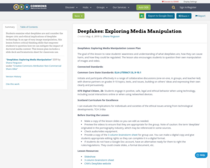Learning Domain: Expectations
Standard: Cite evidence to explain and justify reasoning.
Degree of Alignment:
Not Rated
(0 users)
Learning Domain: Expectations
Standard: Make inferences to support comprehension.
Degree of Alignment:
Not Rated
(0 users)
Learning Domain: Expectations
Standard: Use the accepted rules governing a specific format to create quality work.
Degree of Alignment:
Not Rated
(0 users)
Learning Domain: Expectations
Standard: Use appropriate voice and tone when speaking or writing.
Degree of Alignment:
Not Rated
(0 users)
Learning Domain: Computational Thinker
Standard: Students break problems into component parts, extract key information, and develop descriptive models to understand complex systems or facilitate problem-solving.
Degree of Alignment:
Not Rated
(0 users)
Learning Domain: Digital Citizen
Standard: Students engage in positive, safe, legal and ethical behavior when using technology, including social interactions online or when using networked devices.
Degree of Alignment:
Not Rated
(0 users)
Learning Domain: Empowered Learner
Standard: Students understand the fundamental concepts of technology operations, demonstrate the ability to choose, use and troubleshoot current technologies and are able to transfer their knowledge to explore emerging technologies.
Degree of Alignment:
Not Rated
(0 users)
Learning Domain: Knowledge Constructor
Standard: Students plan and employ effective research strategies to locate information and other resources for their intellectual or creative pursuits.
Degree of Alignment:
Not Rated
(0 users)
Learning Domain: Knowledge Constructor
Standard: Students evaluate the accuracy, perspective, credibility and relevance of information, media, data or other resources.
Degree of Alignment:
Not Rated
(0 users)
Learning Domain: Knowledge Constructor
Standard: Students build knowledge by actively exploring real-world issues and problems, developing ideas and theories and pursuing answers and solutions.
Degree of Alignment:
Not Rated
(0 users)
Learning Domain: Social Studies Skills
Standard: Evaluate the breadth, reliability, and credibility of primary and secondary sources to determine the need for new or additional information when researching an issue or event
Degree of Alignment:
Not Rated
(0 users)
Learning Domain: Social Studies Skills
Standard: Evaluate the validity, reliability, and credibility of sources when researching an issue or event
Degree of Alignment:
Not Rated
(0 users)
Learning Domain: Speaking and Listening
Standard: Initiate and participate effectively in a range of collaborative discussions (one-on-one, in groups, and teacher-led) with diverse partners on grades 9–10 topics, texts, and issues, building on others’ ideas and expressing their own clearly and persuasively.
Degree of Alignment:
Not Rated
(0 users)
Learning Domain: Speaking and Listening
Standard: Initiate and participate effectively in a range of collaborative discussions (one-on-one, in groups, and teacher-led) with diverse partners on grades 9���10 topics, texts, and issues, building on others�۪ ideas and expressing their own clearly and persuasively.
Degree of Alignment:
Not Rated
(0 users)
Learning Domain: Inquiry, Critical Thinking, and Knowledge Acquisition
Standard: Contribute to the exchange of ideas within the learning community.
Degree of Alignment:
Not Rated
(0 users)
Learning Domain: Knowledge Sharing and Civic Engagement
Standard: Show social responsibility by participating actively with others in learning situations and by contributing questions and ideas during group discussions.
Degree of Alignment:
Not Rated
(0 users)
Learning Domain: Knowledge Sharing and Civic Engagement
Standard: Use knowledge and information skills and dispositions to engage in public conversation and debate around issues of common concern.
Degree of Alignment:
Not Rated
(0 users)
Learning Domain: Knowledge Sharing and Civic Engagement
Standard: Use information and knowledge in the service of democratic values.
Degree of Alignment:
Not Rated
(0 users)
Cluster: Comprehension and Collaboration.
Standard: Initiate and participate effectively in a range of collaborative discussions (one-on-one, in groups, and teacher-led) with diverse partners on grades 9–10 topics, texts, and issues, building on others’ ideas and expressing their own clearly and persuasively.
Degree of Alignment:
Not Rated
(0 users)



The value here in this module is probably one of those things you can not put a price tag on. This information is invaluable to our students and their families and by way of extension to society as a whole.
The 'Extensions' alone are worthy of an educator's consideration.
"Students write a letter to a state or federal representative to ask for an added regulation.
Students examine YouTube policies to see how Deepfakes might be flagged or monitored.
Students find their own example of a harmful hoax or deepfake video.
(Warning: deepfakes started in the pornography industry).
Guide students to YouTube and/or a site that flags fake content like Snopes."